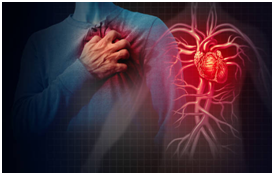Uncovering Unusual Stroke Symptoms: Going Beyond the Obvious Signs"
A brain attack is another
name for a stroke. A blood artery in the brain bursts or something limits the
blood supply to a particular area of the brain for this to occur. This may result
in death, permanent disability, or brain damage. The majority of stroke victims
are over 60 years old. Strokes can, however, also happen in young adults or
teenagers who are susceptible to other non-age-related risk factors. Here are
some stroke symptoms that are both common and unusual. If you
experience a stroke or someone close to you does, being aware of these symptoms
is crucial for prompt medical treatment.
Stroke victims frequently exhibit facial paralysis, which makes it difficult for them to smile and may cause their mouths or eyes to droop. Arm weakness, where the patient is unable to raise both arms, is another typical symptom. The third typical symptom is speech impairment, which manifests as difficulties speaking coherently or as the use of inappropriate words. If you see any of these symptoms, you must phone an ambulance right once. In addition to these typical symptoms, here are a few less typical ones that could nevertheless point to a stroke. Vision changes can result from a stroke. Your visual field from one side of your eyesight can be reduced by a stroke to the back of your brain.
A rapid, excruciating headache may strike hemorrhagic stroke victims. When a blood vessel in the brain bursts, it might result in a hemorrhagic stroke. The usual culprit here is excessive blood pressure. An ischemic stroke, which is more frequent, takes place when blood flow to the brain is interrupted. These are typically brought on by a blockage or clot, both of which are frequently brought on by elevated cholesterol and/or blood pressure.
Numbness, tingling, or a lack of sensation on one side of the body are further signs of a stroke. In addition, one may lose coordination, walk unsteadily, or feel lightheaded. Some patients who have had a stroke may develop nausea and vomiting all of a sudden. It is best to not ignore these symptoms and visit your doctor for a professional diagnosis because they do not specifically point to stroke as the cause. Numerous lifestyle adjustments can lower the risk of having a stroke. These include giving up smoking, eating healthily, keeping a healthy weight, engaging in regular exercise, and abstaining from or only taking moderate amounts of alcohol.






Comments
Post a Comment